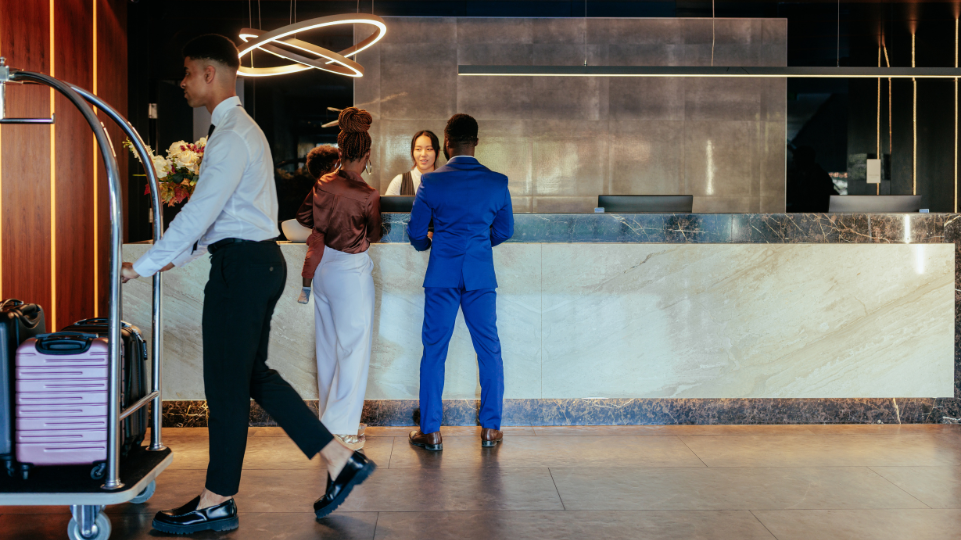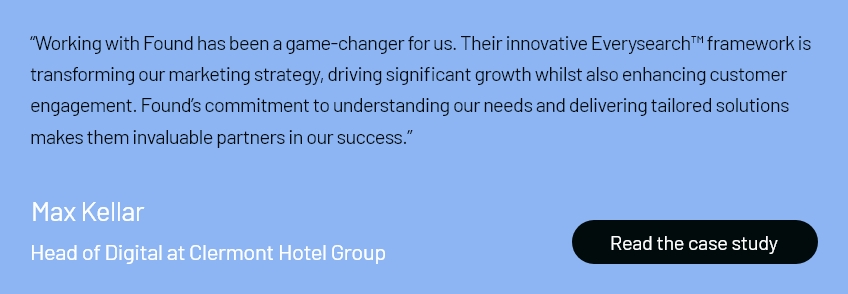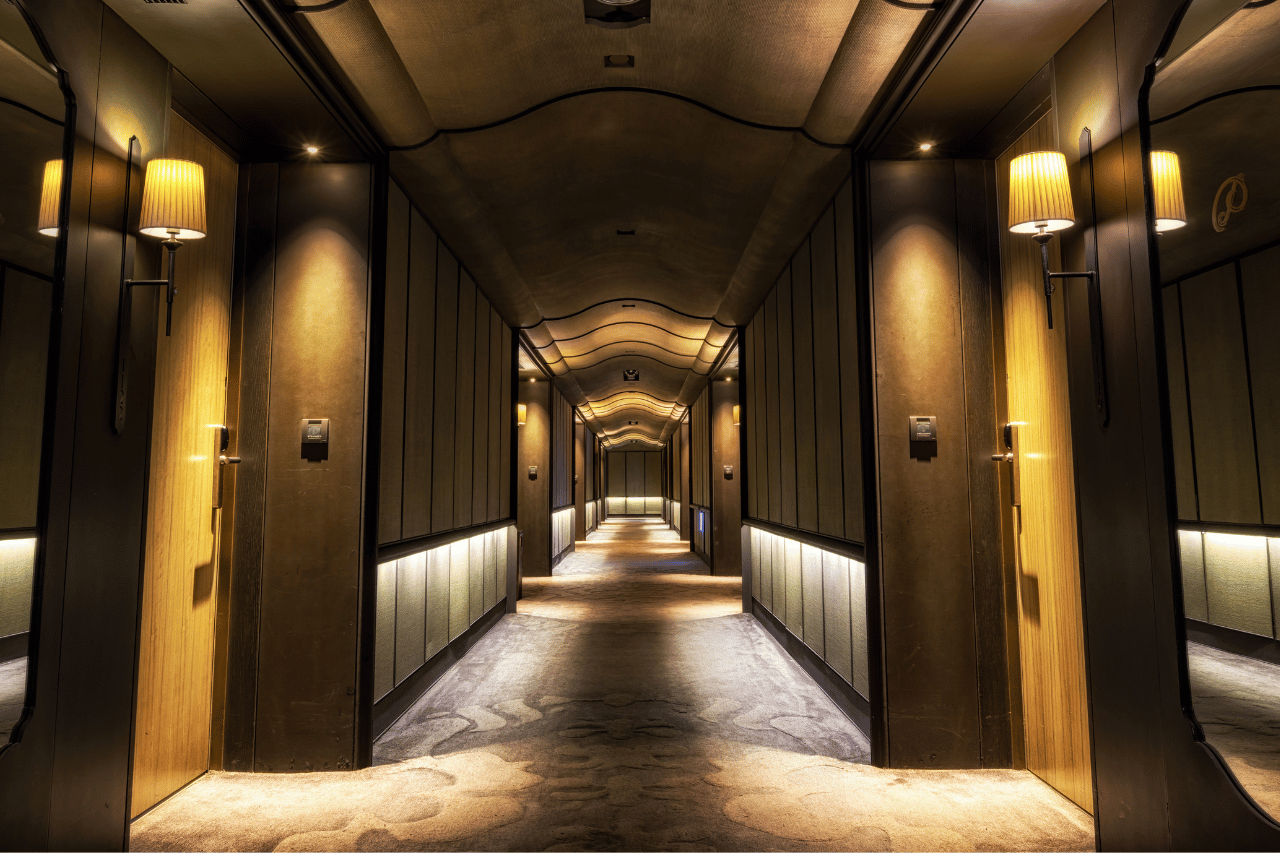Stepping into 2025, hospitality marketing is being transformed by technology, changing guest expectations, and a growing emphasis on personalization and sustainability. These trends highlight the importance of adapting to new channels, including platforms beyond traditional search engines, to capture guests’ attention in a digital world. Here’s a guide to the top hospitality marketing trends that are reshaping the industry.

What is hospitality marketing?
Hospitality marketing involves strategies to promote hotels, restaurants, resorts, and other services within the travel sector. This type of marketing aims to enhance brand visibility, attract new guests, and build loyalty by creating meaningful connections through both digital and in-person experiences.
Why is marketing important in hospitality?
Marketing is essential in hospitality for several reasons:
- Engaging Diverse Guest Preferences: From leisure travellers to business visitors, effective marketing helps tailor offerings to meet various guest needs.
- Building Long-Term Relationships: By engaging guests and providing personalised experiences, hospitality brands can foster loyalty and encourage repeat bookings.
- Driving Growth Through Technology: Innovative marketing uses tools like AI and data analytics to streamline processes, reduce costs, and offer more relevant experiences.

2025 hospitality marketing trends
With a shift away from conventional search engines, hospitality marketing is embracing more dynamic, guest-centric channels. Below are the emerging trends and tools brands can leverage to stay ahead.
- Omnichannel Discoverability Beyond Search Engines
Today’s travellers often bypass traditional search engines, turning instead to social platforms, review sites, and travel apps. For hospitality brands, being present on these channels—where potential guests actively seek travel recommendations—has become crucial. Utilising metasearch engines like Google Hotel Ads or TripAdvisor, along with social platforms like Instagram and TikTok, enhances discoverability and connects hotels with audiences earlier in their planning stages. By strategically placing their brands on these channels, hospitality businesses can capture the attention of travellers researching destinations, accommodations, and experiences across various platforms.
. - Personalised Guest Experiences with AI and Data Insights
AI and data analytics allow hotels to anticipate guest preferences and provide customised experiences, from tailored room amenities to personalised dining options. For instance, AI can help hotels create personalised recommendations for guests based on past stays or preferences, providing everything from activity suggestions to curated wellness options. This trend aligns with the growing expectation of “hyper-personalization,” where guests expect tailored services that feel unique to their needs.
. - Sustainability and Green Practices
As travellers become increasingly eco-conscious, hospitality brands are adopting sustainable practices to meet these preferences. From eliminating single-use plastics to sourcing local ingredients, sustainability is not only a way to appeal to guests but also a long-term investment in brand integrity. Hotels embracing green practices—such as energy-efficient lighting and water conservation measures—stand out to environmentally conscious travellers. This emphasis on sustainability can enhance brand image, attract eco-minded guests, and reduce operational costs.
. - Health and Wellness Experiences
The demand for wellness amenities is growing, as travellers prioritise physical and mental well-being during their stays. Hotels are expanding their wellness offerings beyond spas to include fitness programs, mental health retreats, and rooms with wellness-focused amenities like air purifiers and circadian lighting. Some properties are even incorporating specialised health services, like yoga and meditation classes, to cater to wellness-focused travellers. By investing in wellness, hospitality brands can provide memorable, rejuvenating experiences that boost guest satisfaction and encourage repeat visits
. - Contactless and Seamless Technology
Contactless technology has evolved from a convenience to a necessity, with guests expecting seamless, touch-free experiences from check-in to check-out. The integration of digital keys, mobile check-in, and in-app services allows guests to control their stay without relying on traditional, in-person interactions. This convenience improves guest satisfaction and operational efficiency, reducing the need for additional staffing. As we move into 2025, properties that offer these tech-driven experiences are better positioned to attract modern travellers looking for efficiency and autonomy
. - Enhanced Content Marketing and Storytelling
Hospitality brands are increasingly using storytelling to connect with audiences, sharing the unique stories behind their locations, values, and services. This trend is especially powerful in digital spaces, where blogs, social media posts, and video content can bring a brand’s personality to life. By sharing stories that highlight local culture, environmental efforts, or even guest testimonials, hotels can create a narrative that resonates with travellers and encourages engagement. Platforms like Instagram, YouTube, and blog articles can help brands build trust, enhance engagement, and ultimately drive bookings
. - Workation and Flexible Stays
With the rise of remote work, hospitality brands are offering “workation” packages that combine leisure and productivity features. These packages often include access to co-working spaces, high-speed internet, and flexible booking options that allow guests to work remotely while enjoying travel. This trend appeals to digital nomads and professionals seeking a change of scenery without interrupting their work routines. By providing amenities tailored to remote workers, hotels can capture a growing demographic that values flexibility

What is the future of hospitality marketing?
As hospitality brands look ahead, an integrated approach to marketing that spans multiple platforms and touchpoints will be essential. With Everysearch™ insights and AI-driven tools like Luminr, brands can gain a holistic view of the search landscape, allowing them to strategically position themselves across platforms that matter most to target audiences. This approach not only aligns with current trends but also prepares hospitality brands for future shifts in guest expectations, making them more adaptable, guest-focused, and competitive.
If you want to really elevate your consumer experience leverage real time trends, such as viral foodie hotspots, into your digital strategy to keep your content fresh, exciting and shareable.
Ready to elevate your hospitality marketing strategy? Visit our Hospitality Services page or contact our team to learn more.


